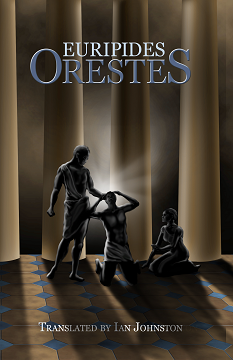Questions? Call us
toll free:
1-800-856-3060
Translated by Ian Johnston
In Orestes, the famous Greek tragic dramatist Euripides (c. 480 BC to 406 BC) revisits the bloody history of the House of Atreus and offers his very different vision of the reactions of Orestes and Electra to the death of their mother, Clytaemnestra, whom they have just murdered in order to avenge the killing of their father, Agamemnon.
Euripidesí play, a radical retelling of this old story, vigorously attacks the treatments of the same events by his predecessors, Aeschylus and Sophocles, and seems to suggest that the old myths cannot sustain those earlier visions of tragic heroism and metaphysical meaning. Here the conventional sources of appropriate behavior fail to produce nobility or justice: traditional heroes, like Menelaus, are cowards, the public assembly is fickle and easily swayed, and the gods are unjust and unreliable. The play is famous for its eventful plot and for the disagreements it has prompted about what it may be saying about Athenian life. Responses to it have ranged all the way from the claim that it is simply a theatrical piece without wider significance to the view that it is a cry of despair about the inadequacy of human beings to meet the complex and brutal demands of contemporary Athenian life.
Ian Johnstonís new translation remains faithful to the original Greek and offers a modern English poetic text which is particularly well suited to dramatic recitation or performance.
Classics/ Greek Drama ISBN:
978-1-935238-94-2
USD $9.95
At Richer Resources, we are dedicated to the creation of high quality books, art and other media intended to enrich the lives of individuals of all ages.
As an independent publisher, we are bound by a sense of integrity and quality to produce products which enhance the lives and vision of individuals everywhere.
Sign up to receive notice of free eBooks, new releases and special subscriber-only offers.
(You can unsubscribe at any time)
